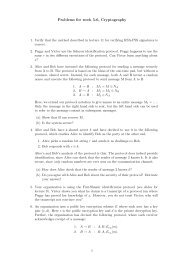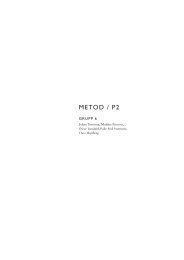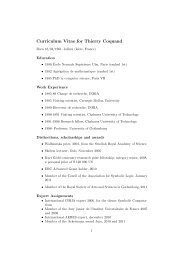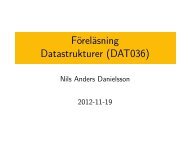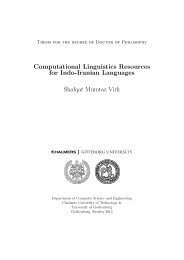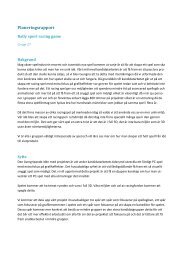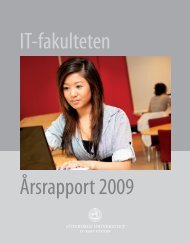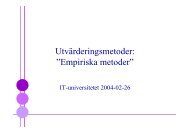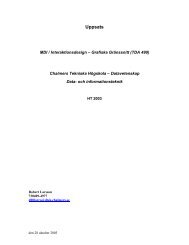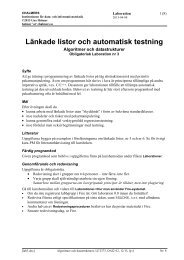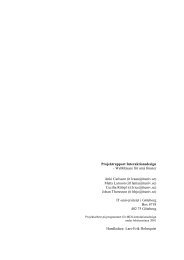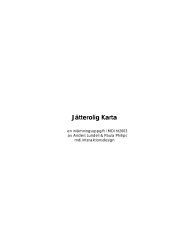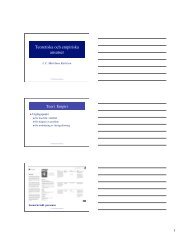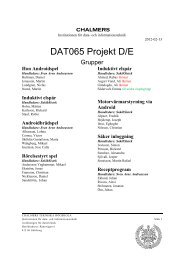GF Russian Resource Library
GF Russian Resource Library
GF Russian Resource Library
You also want an ePaper? Increase the reach of your titles
YUMPU automatically turns print PDFs into web optimized ePapers that Google loves.
where ExtraEngAbs is a collection of syntactic structures specific to English, and<br />
DictEngAbs is an English dictionary (at the moment, it consists of IrregEngAbs,<br />
the irregular verbs of English). Each of these language-specific grammars has the<br />
potential to grow into a full-scale grammar of the language. These grammars can<br />
also be used as libraries, but the possibility of using functors is lost.<br />
To give a better overview of language-specific structures, modules like are built<br />
(for example, ExtraEngAbs) from a language-independent module ExtraAbs by<br />
restricted inheritance:<br />
abstract ExtraEngAbs = Extra [f,g,...]<br />
Thus any category and function in Extra may be shared by a subset of all languages.<br />
One can see this set-up as a matrix, which tells what Extra structures are<br />
implemented in what languages. For the common API in Grammar, the matrix is<br />
filled with 1’s (everything is implemented in every language).<br />
Language-specific extensions and the use of restricted inheritance is a recent<br />
addition to the resource grammar library, and has only been exploited in a very<br />
small scale so far. ExtraAbs and DictAbs are not implemented for <strong>Russian</strong>.<br />
3 <strong>Resource</strong><br />
.<br />
This module contains operations that are needed to make the resource syntax<br />
work. To define everything that is needed to implement Test, it moreover contains<br />
regular lexical patterns needed for Lex.<br />
resource ResRus = ParamX ** open Prelude in {<br />
flags coding=utf8 ; optimize=all ;<br />
The flag coding=utf8 indicates that <strong>Russian</strong> grammars use UTF-8 encoding for<br />
Cyrillic letters. The flag optimize=all turns on the optimization procedure, which<br />
can result in reducing the grammar size up to 50% of the original.<br />
3.1 Enumerated parameter types<br />
These types are the ones found in school grammars. Their parameter values are<br />
atomic. Some parameters, such as Number, are inherited from ParamX.<br />
Declination forms depend on Case, Animacy , Gender: bolьxie doma - bolьxih<br />
domov (big houses - big houses’); and on Number: bolьxo� dom - bolьxie doma<br />
(a big house - big houses).<br />
There are three genders: masculine, feminine and neuter. A number of <strong>Russian</strong><br />
nouns have common gender. They can denote both males and females: umnica (a<br />
clever person), inжener (an engineer). We overlook this phenomenon for now.<br />
param<br />
Gender = Masc | Fem | Neut ;<br />
There are six cases: nominative, genitive, dative, accusative, instructive and prepositional:<br />
Case = Nom | Gen | Dat | Acc | Inst | Prepos ;<br />
Animacy plays role only in the Accusative case (Masc Sg and Plural forms): Accusative<br />
Animate = Genitive, Accusaive Inanimate = Nominative � l�bl� bolьxie<br />
doma - � l�bl� bolьxih muжqin (I love big houses - I love big men):<br />
Animacy = Animate | Inanimate ;<br />
9



